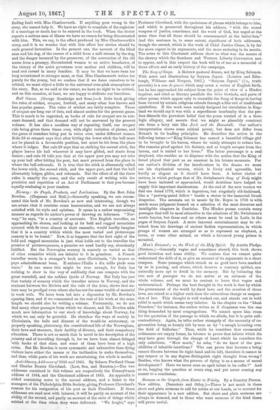The Song of Songs. A Hebrew pastoral drama, not by
King Solomon.. With notes and illustrations by Satyam Jayati. (London and Edin- burgh, Williams and Norgate, 1867.) "Satyam Jayati," (i.e., truth prevails) is a nom de guerre which may cover a writer of English birth, but he has approached his subject from the point of view of a Hindoo inquirer, and cited as literary parallels the Gita Govinda, and parts of
other poems which appear only to resemble the Song of Songs in having: been viewed by certain religious schools through a like veil of traditional symbolism. If the work were mainly designed for circulation in Eng- land we should say it was with a superfluous inurbanity that the pre- face discards the prevalent belief that the poem treated of is a theo- logic allegory, and asserts that we might as plausibly construct
one from a fairy tale like Jack and the Beanstalk. Our author's interpretation shows some critical power, but does not differ front Rdnan's in its leading principles. He describes the action in the following terms:—"King Solomon has caused a beautiful village girl to be brought to his harem, where he vainly attempts to seduce her. She remains proof against his flattery, and at length escapes from the harem, and is united to her lover." The latter personage is a real` shepherd, who enables us to dispense with the notion that the King of Israel played that part as an amateur in his leisure moments. For- our author's division of the interlocutors in the drama we must see his rhythmical version, which is lively and agreeable, but hardly as elegant as it should have been. A better choice of metres, in which perhaps that of Mr. Swinbnrne's Song of Italy might have been imitated or approached, would doubtless have helped to. supply this important desideratum. At the end of the new version we find one dated 1770, which is ingenious, but singularly old-fashioned, like a " periwig-pated fellow" beside a statue in the immortal Greek draperies. The serenata set to music by Dr. Boyce in 1750 is- with
mach more judgment framed on a selection of the most decorous and intelligible chapters in Canticles. The Hindoo poems contain many passages that will be moa( attractive to the admirers of Mr. Swinbnrne's erotic fancies, but these and no others must be read in Latin in the pages. of Satyam Jayati. A more innocent entertainment may be ob- tained from his drawings of ancient Indian representations, in which.
groups of women are arranged so as to represent an elephant, a horse, or some other animal, on which a favoured young prince is. mounted.






























 Previous page
Previous page